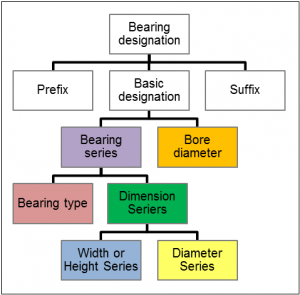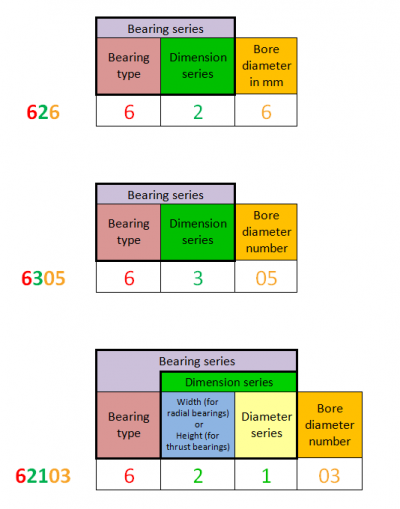Bearing designation: Difference between revisions
(Created page with "To identify a bearing, it’s assigned a standardized code referred to as a designation. The designation is made up of one to three parts; * Prefix * Basic designation * Suffi...") |
No edit summary |
||
| Line 1: | Line 1: | ||
[[File:Bearing_designation_tree.png|right|300 px]] | |||
To identify a bearing, it’s assigned a standardized code referred to as a designation. The designation is made up of one to three parts; | To identify a bearing, it’s assigned a standardized code referred to as a designation. The designation is made up of one to three parts; | ||
* Prefix | * Prefix | ||
| Line 24: | Line 26: | ||
* 62103 (5 digit designation) | * 62103 (5 digit designation) | ||
[[File:Basic bearing designation examples.png|right|400 px]] | |||
'''626''' | '''626''' | ||
* The first digit always tells us the Bearing type (6 = Single row deep ball groove bearing.) | * The first digit always tells us the Bearing type (6 = Single row deep ball groove bearing.) | ||
| Line 43: | Line 45: | ||
**the third digit (1) is the diameter series | **the third digit (1) is the diameter series | ||
* The fourth and fifth digits (03) tells us the bearing Bore size (03 = 17 mm.) | * The fourth and fifth digits (03) tells us the bearing Bore size (03 = 17 mm.) | ||
Revision as of 11:39, 7 May 2021
To identify a bearing, it’s assigned a standardized code referred to as a designation. The designation is made up of one to three parts;
- Prefix
- Basic designation
- Suffix
Prefixes and suffixes, which provide additional information to the designation, are not always included.
The meaning of the numbers and letters that can be included in a designation is listed in the section Code tables below.
Basic designation
A basic designation contains 3-5 digits that always represent these three pieces of information:
- Bearing type,
- Bearing series, and
- Bore size (inner diameter).
Note: the Bearing type and Bearing series put together is called Bearing series.
Let’s take the following three designations as examples
- 626 (3 digit designation)
- 6305 (4 digit designation)
- 62103 (5 digit designation)
626
- The first digit always tells us the Bearing type (6 = Single row deep ball groove bearing.)
- The second digit (2) tells us the Dimension series (2 = Light).
- In a three digit designation, the third digit (6) tells us the Bore size in mm. So in this case, the Bore diameter is 6 mm.
6305
- Again, the first digit tells us the Bearing Type (6 = Single row deep ball groove bearing.)
- The second digit (3) tells us the Bearing series (3 = Medium.)
- The third and fourth digit (05) tells us the Bore size (05 = 25 mm.)
62103
- First digit for Bearing type as always.
- The second and third digit tells us the Dimension series where
- the second digit (2) is the width code and
- the third digit (1) is the diameter series
- The fourth and fifth digits (03) tells us the bearing Bore size (03 = 17 mm.)
Prefixes and suffixes
A bearing code can also be made longer to include additional information such as;
- Shield code
- Contact angle code
- Matched pair or stack code
- Internal design code
- External configuration code
- Bearing ring shape code
- Internal clearance code
- Tolerance class code
Code tables
A
Additional designation examples
Here are some examples what bearing designations can look like. (What the codes mean is shown under section Code tables below. 6305ZZ

